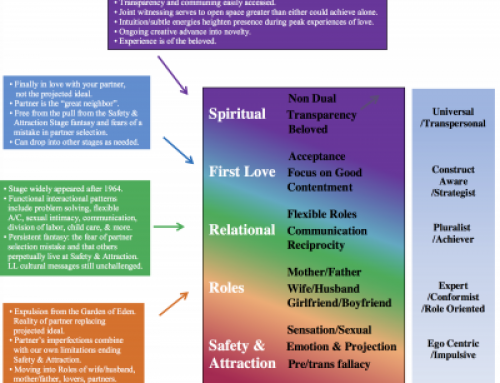Abstract
The couples relationship can be volatile and chaotic when it fails to regulate regression unique to the in mate dyad. One of the issues that distinguish the in mate relationship from all others is the influx of regression that interjects earlier developmental aspects of self into the present, which then must be processed by the couple. The capacities to express and balance regression are not as strongly needed in non-in mate relationships. Regression involves powerful feelings of sensitivity and vulnerability that are frequently expressed in withdrawal behavior or anger. This angry enactment of perhaps one’s earlier unresolved issues predictably elicits a defensive response in a partner. This article explores the central role of regression in intimacy, identifies rigid patterns that fail to meet this essential need, describes a model to assess a couple’s ability to process and balance the expression of regression, and underscores the need for integral sensibilities in the practice of couples therapy. (end of the ABSTRACT )
The Story
Joe entered his home without purging the stress accumulated from the commute and a workday that hadn’t gone well. He was insufficiently aware of his depleted emotional resources and unaware of what he might need or how his wife Eileen could help him process the day. When Eileen failed to acknowledge his arrival loudly enough, his annoyance and anger quickly approached critical mass. She asked him what he would like for dinner, and he retaliated with silence. She got up and entered the kitchen and tried to hug him and he pushed her away. This was a pattern they both unwillingly reenacted throughout the years. His developmental history of unresolved wounds rendered him non-communicative and unable to receive anything she might offer. Feeling rejected and now upset, she asked sarcastically, “What’s wrong with you?” Her critical tone seemed to align her with everything that went wrong that day. He shouted, “There’s nothing wrong with me.” Both his words and behavior didn’t make sense to her and she began to panic.
Eileen always struggled with not feeling accepted, a ssure carved in her self-concept decades ago by her mother. “What did I do now?” she protested without remorse, and thereby increased his disdain. “Why are you always mad at me?” she went on—an unresolved issue now interjected in the midst of a failed connec- tion. “You could have at least said hello,” Joe shouted with the full force of everything that went wrong that day. The shock from his anger caused her to miss the reference to an unheard greeting, the last exit before an all-too-familiar painful exchange. “No matter what I do, it’s never enough. You are always unhappy with me,” as tears began to spill over on to her reddened checks. Joe mocked her crying, guaranteeing that this encoun- ter was headed for much more than a spat. She stormed out. Joe never got dinner or the support he needed. Neither person understood what happened and their relationship structure proved inadequate to avoid another painful regression. Theirs was an intimate relationship attempting to traverse a road with neither posted signs nor landmarks to guide them. This, combined with scant and undisciplined inner awareness, rendered this couple woefully unprepared to process sensitive feelings in their intimate relationship.
Intimate couples
What went wrong?
- Both partners ended up needing something at the same time.
- Neither were emotionally prepared to either listen or nurture.
- Additional issues were thrown into the mix.
- Frustration from a poor bid for connection increased the damage (Gottman, 2011).
- Speci c needs were never stated.Consider the same interchange in a scenario where the couple is ready to handle a poor bid for connec- tion. In this vignette, Eileen and Joe have established Lower-Right (LR) operating rules designed to regulate regression:Eileen: Joe, what do you want for dinner?
Joe (angrily): You could have at least said “Hello.”
Eileen: I’m sorry…I could have said it louder [avoiding personalizing the moment]. What can I do for you?
Joe: I don’t know. I had a bad day. Can you get me a drink?
Eileen: Here you go. What else can I do?
Joe: Nothing. I’m sorry.
What went right?
- Eileen recognized anger as a poorly expressed need.
- She did not personalize Joe’s response and react with anger.
- By avoiding reacting, she could push her needs aside and be there emotionally forher partner.
- She stayed focused upon service to Joe.
- Feeling her immediate and persistent support, Joe quickly apologized.
- Joe’s poor bid for connection still succeeded and the couple avoided chaos.
This article was first published in “Journal of Integral Theory and Practice”
INTIMATE COUPLES: Regression and Lower-Right Supporting Structures, 2014 Thomas A. Habib, Ph.D. Journal of Integral Theory and Practice, Dec.






Leave A Comment